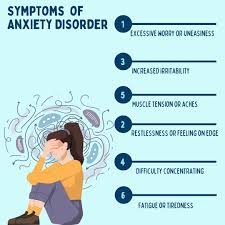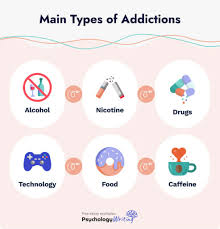Anxiety Disorder: Understanding and Managing Symptoms
Anxiety disorder is a common mental health condition that affects millions of people worldwide. It is characterized by feelings of worry, fear, and unease that can be overwhelming and interfere with daily life. While it is normal to experience occasional anxiety in response to stressful situations, anxiety disorder involves persistent and excessive anxiety that can be difficult to control.
Symptoms of Anxiety Disorder
Common symptoms of anxiety disorder include:
- Excessive worrying
- Feeling restless or on edge
- Irritability
- Trouble concentrating
- Sleep disturbances
- Physical symptoms such as muscle tension, fatigue, and stomach issues
Causes of Anxiety Disorder
Anxiety disorders can have a variety of causes, including genetic factors, brain chemistry, personality traits, and life experiences. Traumatic events, chronic stress, and family history of anxiety disorders can also contribute to the development of the condition.
Managing Anxiety Disorder
While anxiety disorder can be challenging to live with, there are effective treatments available to help manage symptoms. These may include:
- Therapy: Cognitive-behavioral therapy (CBT) is a common form of therapy that helps individuals identify and change negative thought patterns and behaviors contributing to anxiety.
- Medication: Antidepressants and anti-anxiety medications may be prescribed by a healthcare provider to help alleviate symptoms.
- Lifestyle changes: Engaging in regular exercise, practicing relaxation techniques such as deep breathing or meditation, maintaining a healthy diet, and getting adequate sleep can all help reduce anxiety levels.
Seeking Help for Anxiety Disorder
If you or someone you know is experiencing symptoms of anxiety disorder, it is important to seek help from a mental health professional. With proper treatment and support, individuals with anxiety disorder can learn to manage their symptoms effectively and improve their quality of life.
Understanding Anxiety Disorder: Answers to Common Questions
- What is anxiety disorder?
- What are the common symptoms of anxiety disorder?
- What causes anxiety disorder?
- How is anxiety disorder diagnosed?
- What are the treatment options for anxiety disorder?
- Can anxiety disorder be cured?
- How can I help a loved one with anxiety disorder?
- Are there lifestyle changes that can help manage anxiety disorder?
What is anxiety disorder?
Anxiety disorder is a common mental health condition characterized by persistent and excessive feelings of worry, fear, and unease that can significantly impact a person’s daily life. Unlike normal feelings of anxiety that arise in response to stressful situations, anxiety disorder involves heightened levels of anxiety that are difficult to control and may not be proportional to the actual threat or trigger. Individuals with anxiety disorder often experience a range of symptoms, including restlessness, irritability, trouble concentrating, sleep disturbances, and physical manifestations such as muscle tension and fatigue. It is essential for those experiencing symptoms of anxiety disorder to seek help from a mental health professional for proper diagnosis and treatment.
What are the common symptoms of anxiety disorder?
Common symptoms of anxiety disorder include excessive worrying, feeling restless or on edge, irritability, trouble concentrating, sleep disturbances, and various physical symptoms such as muscle tension, fatigue, and stomach issues. These symptoms can be persistent and overwhelming, making it challenging for individuals to manage their daily activities and maintain a sense of well-being. It is important to recognize these signs early on and seek professional help to address anxiety disorder effectively.
What causes anxiety disorder?
Anxiety disorder can be caused by a combination of factors, including genetic predisposition, brain chemistry imbalances, personality traits, and life experiences. Traumatic events, chronic stress, and a family history of anxiety disorders can also contribute to the development of this mental health condition. It’s important to recognize that anxiety disorder is a complex condition with multifaceted causes, and seeking professional help from a mental health provider can aid in understanding individual risk factors and developing effective treatment strategies.
How is anxiety disorder diagnosed?
To diagnose anxiety disorder, healthcare providers typically conduct a thorough assessment that may include a physical examination, a review of medical history, and a discussion of symptoms. They may also use specific diagnostic criteria outlined in the Diagnostic and Statistical Manual of Mental Disorders (DSM-5) to determine if the individual meets the criteria for an anxiety disorder diagnosis. Additionally, healthcare providers may use psychological questionnaires and assessments to evaluate the severity of symptoms and their impact on daily functioning. It is essential for individuals experiencing symptoms of anxiety to seek help from a qualified healthcare professional for an accurate diagnosis and appropriate treatment plan.
What are the treatment options for anxiety disorder?
When it comes to addressing anxiety disorder, there are several treatment options available to help individuals manage their symptoms effectively. Common approaches include therapy, such as cognitive-behavioral therapy (CBT), which aims to identify and modify negative thought patterns and behaviors contributing to anxiety. Medications like antidepressants and anti-anxiety drugs may also be prescribed by healthcare providers to alleviate symptoms. Additionally, lifestyle changes such as regular exercise, relaxation techniques like deep breathing or meditation, a balanced diet, and sufficient sleep can play a crucial role in reducing anxiety levels. It is important for individuals experiencing anxiety disorder to consult with a mental health professional to determine the most suitable treatment plan for their specific needs.
Can anxiety disorder be cured?
The question of whether anxiety disorder can be cured is a common concern for many individuals struggling with this mental health condition. While there is no definitive “cure” for anxiety disorder, it is important to understand that the symptoms can be effectively managed and controlled with the right treatment and support. Through therapy, medication, lifestyle changes, and self-care practices, individuals with anxiety disorder can experience significant relief from their symptoms and improve their overall well-being. It is essential to work closely with a healthcare provider or mental health professional to develop a personalized treatment plan that addresses specific needs and goals in managing anxiety disorder. With dedication and proper support, individuals can lead fulfilling lives despite living with anxiety disorder.
How can I help a loved one with anxiety disorder?
Supporting a loved one with anxiety disorder can make a significant difference in their journey towards managing their condition. It is essential to approach them with empathy, understanding, and patience. Encourage open communication and listen attentively to their feelings and concerns without judgment. Offer your support in practical ways, such as accompanying them to therapy sessions or helping them practice relaxation techniques. Educate yourself about anxiety disorder to better understand what they are going through and provide a safe and non-judgmental space for them to express themselves. Remember that each individual’s experience with anxiety disorder is unique, so being there for your loved one consistently and compassionately can help them feel understood and supported on their path to recovery.
Are there lifestyle changes that can help manage anxiety disorder?
Yes, there are lifestyle changes that can help manage anxiety disorder. Making healthy lifestyle choices can play a significant role in reducing symptoms of anxiety and improving overall well-being. Engaging in regular physical exercise, practicing relaxation techniques such as deep breathing or meditation, maintaining a balanced diet, getting enough sleep, and avoiding excessive caffeine and alcohol intake are all beneficial strategies for managing anxiety. Additionally, setting aside time for self-care activities, establishing a routine, and seeking social support can also contribute to better mental health and help individuals cope with anxiety more effectively. It is important to consult with a healthcare provider or mental health professional to develop a personalized plan that addresses specific needs and preferences when managing anxiety disorder through lifestyle changes.




